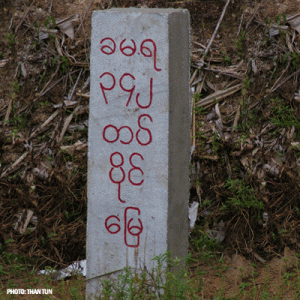Local Residents Face Continuing Land Abuse In Kaw Thaung
July 12, 2012
HURFOM: Military authorities continue to commit land confiscation violations against residents of Kaw Thaung Township in Southern Burma. Locals often lack critical information about their rights and relevant laws, and the military is still perceived to act with impunity in cases of land disputes. The impact of land confiscation is not merely an affront to law, but also presents severe challenges for residents who depend heavily on their lands and plantations to earn a living. The country’s policies are undergoing change, but communities will not experience reform until locals are protected from destructive land seizure practices.
 On June 21, 2012, military authorities from Light Infantry Battalion (LIB) No. 342 arrived in the Shwe Pyi Thar quarter of Kaw Thaung, two miles from the LIB base. The officials placed a concrete land marker to indicate the area as confiscated, despite the land being home to local families and a productive agricultural site growing coconuts, rubber and betel nut trees, cashews, jackfruit, wild mangosteen (santol) and bananas. The Democratic Party (Myanmar) Tenasserim Region party organizer U Than Htun began to take action on behalf of the residents, but on the 3rd and 4th of July, military authorities came and threatened locals regarding the land. On the 4th or 5th of July, authorities arrived again to paint the numbers “521/804” on the concrete marker, which locals interpreted as a demonstration that plans for confiscation were moving ahead.
On June 21, 2012, military authorities from Light Infantry Battalion (LIB) No. 342 arrived in the Shwe Pyi Thar quarter of Kaw Thaung, two miles from the LIB base. The officials placed a concrete land marker to indicate the area as confiscated, despite the land being home to local families and a productive agricultural site growing coconuts, rubber and betel nut trees, cashews, jackfruit, wild mangosteen (santol) and bananas. The Democratic Party (Myanmar) Tenasserim Region party organizer U Than Htun began to take action on behalf of the residents, but on the 3rd and 4th of July, military authorities came and threatened locals regarding the land. On the 4th or 5th of July, authorities arrived again to paint the numbers “521/804” on the concrete marker, which locals interpreted as a demonstration that plans for confiscation were moving ahead.
While villagers faced encounters with local troops, military authorities were directing land surveyors to change the names on land ownership records. Most landowners do not have documents to prove their rightful ownership, and are often unsure of the official boundaries of their lands, further complicating the matter.
Six people—U Thain Aung, U Aung Moe, U Than Oo, U Kan Htun, U Nyou and one Tavoy woman—lost property to this recent confiscation after working on their lands since 1977. One resident had land and plantations worth between 20 and 30 million Kyat. In 1984, he was given a government land grant permitting him to develop his fields in Shwe Pyithar quarter, and now hopes this previous authorization will assist in getting the land returned. He and the five other landowners approached to help them submit a letter of appeal to Nay Pyi Taw, requesting their ownership be restored.
The landowner said, “They confiscated 7 acres of my land, including 1,700 rubber trees, 20 jackfruit trees, 10 mango trees, and 8 wild mangosteen (or santol) plants. First, the military authorities called and told me that they would not take my land and that I could still work on the land. But it is impossible to work after they put up the cement marker on my property. This is the same as if they took over my land. In 2007, the military authorities had already set up a wooden sign, but this year, they changed the sign to a cement marker. I am now confused about my land, whether I can continue working or if I have to stop. I have four children to support, two are attending university and the other two are in 9th and 11th grades. I even planned to go work in Thailand to cover my children’s schooling.”
Locals reported to HURFOM that the Expressway Company is undertaking a rock removal project in the contested area to transport and sell stone to foreign businesses.
In Kaw Thaung, land surveyors and authorities have confiscated three of every five properties, aided by the fact that many residents do not understand land laws. However, locals have recently become more informed about their rights after the Mon Democratic Party, National League for Democracy (NLD), and All Mon Regions Democracy Party (AMDP) sent members to describe relevant laws. While awareness is growing, some residents in Kaw Thaung Township remain frightened to speak out publicly about land seizures.
U Than Htun said, “Because the military thinks the power is in their hands, they commit many land abuses, like confiscating land from residents and selling them to businesses. We plan to submit a letter of appeal signed by the landowners to President Thein Sein in Nay Pyi Taw to get their lands back. Soon, Tenasserim Region Government Chief Minister U Myat Ko will come to Kaw Thaung township to discuss land confiscation, and we think he will solve the problem here or not. If the minister takes action on the problem, the residents will be satisfied. If not, the residents are going ahead with their plan [to send the letter]. And I suggested to them that they do it.”
Between 1989 and 1990, LIB No. 262 established their military base in Kaw Thaung Township, as did LIB No. 342 in 1991 and 1992.
Comments
Got something to say?
You must be logged in to post a comment.



















































